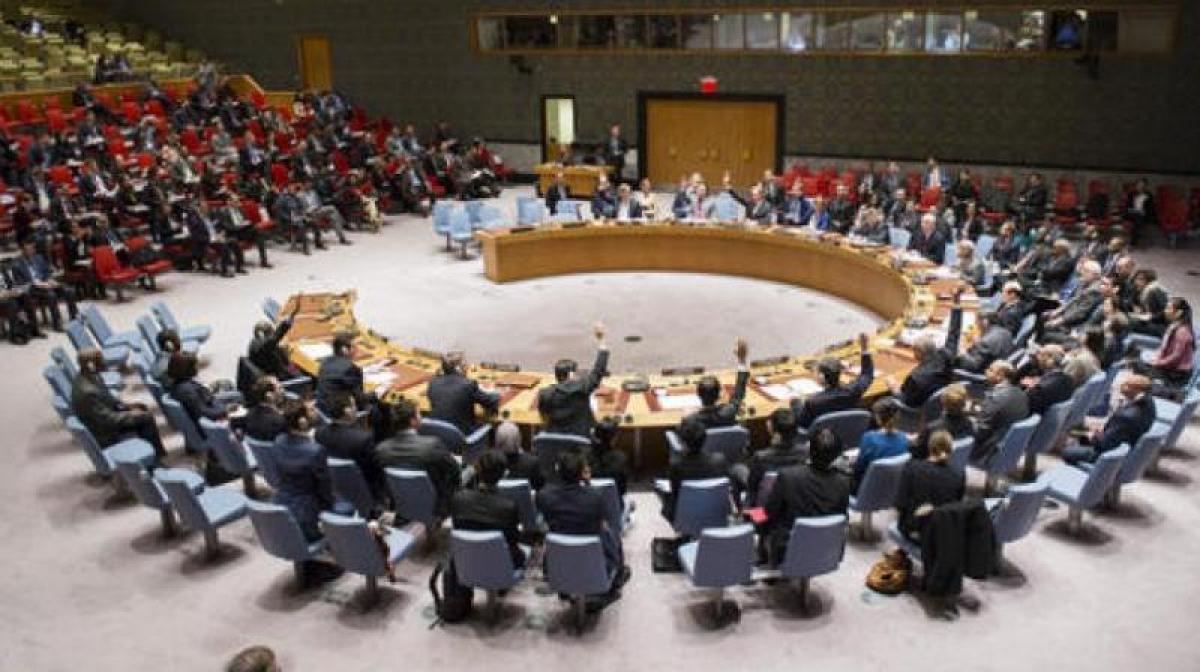Live
- 555th Prakash Purab celebrated with gaiety
- Good news for Atmakur farmers
- High-risk aortic valve replacement surgery performed successfully
- HMWSSB MD holds review meeting on OTS-2024 scheme
- Dhobi Ghat assessed for potential to host sports complex
- SCR bets on LHB train coaches for safety
- SVU felicitates best teachers
- Tata Group to market Araku coffee
- Union Min assures development of infra in tribal mandals
- KTR, Harish will turn political rivals soon: TPCC Chief
Just In

The UN Security Council is set to vote on Monday afternoon on a watered-down US-drafted resolution to impose new sanctions on North Korea over its latest nuclear test, diplomats said, but it was unclear whether China and Russia would support it.
The UN Security Council is set to vote on Monday afternoon on a watered-down US-drafted resolution to impose new sanctions on North Korea over its latest nuclear test, diplomats said, but it was unclear whether China and Russia would support it.
The draft resolution appears to have been weakened in a bid to appease North Korea’s ally China and Russia following negotiations during the past few days.
In order to pass, a resolution needs nine of the 15 Security Council members to vote in favor and no vetoes by any of the five permanent members - the United States, Britain, France, Russia and China.
The draft, seen by Reuters on Sunday, no longer proposes blacklisting North Korean leader Kim Jong-Un. The initial draft proposed he be subjected to a travel ban and asset freeze along with four other North Korea officials. The final text only lists one of those officials.
The draft text still proposes a ban on textile exports, which were North Korea’s second-biggest export after coal and other minerals in 2016, totaling $752 million, according to data from the Korea Trade-Investment Promotion Agency. Nearly 80 percent of the textile exports went to China.
The draft drops a proposed oil embargo and instead intends to impose a ban on condensates and natural gas liquids, a cap of two million barrels a year on refined petroleum products, and a cap crude oil exports to North Korea at current levels.
China supplies most of North Korea’s crude. According to South Korean data, Beijing supplies roughly 500,000 tonnes of crude oil annually. It also exports 200,000 tonnes of oil products, according to UN data. Russia’s exports of crude oil to North Korea are about 40,000 tonnes a year.
The draft resolution also no longer proposes an asset freeze on the military-controlled national airline Air Koryo.
Since 2006, the Security Council has unanimously adopted eight resolutions ratcheting up sanctions on North Korea over its ballistic missile and nuclear programs.
The Security Council last month imposed new sanctions over North Korea’s two long-range missile launches in July. The Aug. 5 resolution aimed to slash by a third Pyongyang’s $3 billion annual export revenue by banning coal, iron, lead and seafood.
Foreign Workers
The new draft resolution drops a bid to remove an exception for transshipments of Russian coal via the North Korean port of Rajin. In 2013 Russia reopened a railway link with North Korea, from the Russian eastern border town of Khasan to Rajin, to export coal and import goods from South Korea and elsewhere.
The original draft resolution would have authorized states to use all necessary measures to intercept and inspect on the high seas vessels that have been blacklisted by the council.
However, the final draft text calls upon states to inspect vessels on the high seas with the consent of the flag state, if there’s information that provides reasonable grounds to believe the ship is carrying prohibited cargo.
The Aug. 5 resolution adopted by the council capped the number of North Koreans working abroad at the current level. The new draft resolution initially imposed a complete ban on the hiring and payment of North Korean laborers abroad.
The final draft text to be voted on Monday by the council would require the employment of North Korean workers abroad to be authorized by a Security Council committee.
However, this rule would not apply to “written contracts finalized prior to the adoption of this resolution” provided that states notify the committee by Dec. 15 of the number of North Koreans subject to these contracts and the anticipated date of termination of these contracts.
Some diplomats estimate that between 60,000 and 100,000 North Koreans work abroad. A UN human rights investigator said in 2015 that North Korea was forcing more than 50,000 people to work abroad, mainly in Russia and China, earning between $1.2 billion and $2.3 billion a year. The wages of workers sent abroad provide foreign currency for the Pyongyang government.
There is new political language in the final draft urging “further work to reduce tensions so as to advance the prospects for a comprehensive settlement” and underscoring “the imperative of achieving the goal of complete, verifiable and irreversible denuclearization of the Korean Peninsula in a peaceful manner.”

© 2024 Hyderabad Media House Limited/The Hans India. All rights reserved. Powered by hocalwire.com







